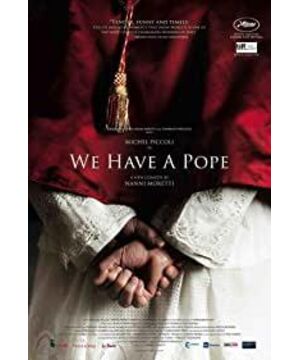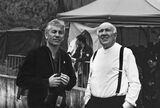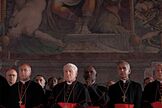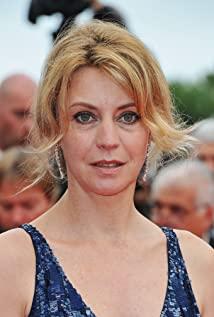Apart from things like the pope coming out to eat and stay without paying money, the most exaggerated arrangement is the actor whose desire is so strong that he has gone crazy. The Pope was also eager to do something for the world, and he was basically in an abnormal state. But at the end of the film, in the scene where the Pope was found, the actor couldn't wait to grab what he wanted and perform on stage. The Pope, however, is the highest honor in the world. Among all the opportunities available at his fingertips, he resolutely chose not to be greedy, and resolutely chose to recognize and accept his own humanity and his own weaknesses. On this basis, he should be regarded as the most qualified pope in history.
Regarding the subject of religion, many people in China may not be interested. Although I am not religious, I understand (at least try to understand) religion (thanks to: ancient alien theorists). To a certain extent, I think this film not only discusses human nature, but also the author's religious view. Why did the pope keep repeating that the church needs reform? In fact, when he nagged himself, there was a line saying that the church was too far away from people. If he were in a high position, he would be even more invisible and unable to remember. Others and himself would exist as a "person".
And people are imperfect. If you pretend to be perfect, it will be even more imperfect.
Even the shaping of two psychoanalysts is saying the same thing: an excellent psychoanalyst can use high-sounding theories to bluntly explain all problems; the best psychoanalyst can see the real side of things in a simple and clear way: The Pope is currently depressed.
I have to say that I knelt for the scene where the Pope was found. After watching it, I went back and watched the scene again. An exciting moment, understatement with the simplest, most reasonable, and most elegant design will incite the audience's feelings. I don't admire high-tech long lenses or anything. I think a lot of those films are on the photography team. As a film art, I think the most important thing is not how the film is expressed in form, but how a director tells a story. This is about the same as the conductor of a symphony orchestra is more important than the principal violin. It's too far, maybe I'm in a good mood today, and I'm happy to see a choreography that may be unconscious. I know that this is actually sensational. Many literary and artistic movies don’t like sensationalism (especially on French films). I don’t know if they think sensationalism is too vulgar. In fact, I also think most of the sensationalism, because they are inciting things on the screen, just like the inauguration declarations of politicians, the masses can be excited without their brains. But I think this scene is inciting things that are not on the screen, the good-hearted decisions of the election members, the achievements of male lunatic actors and the mentality of villains, and of course the pope is found. Finish explaining the same scene. The atmosphere is rendered using a specific example of intermittent performances by actors, and standing ovation is of course old-fashioned. Maybe it can't be said to be the best scene, but the idea of this rhythm is worth learning. As a grassroots (or trying to get closer to the grassroots) movie lover, I actually agree with Walter Murch's point of view. This existing master editor believes that the most important goal of the film is to get the audience involved. As long as you can invest, many other defects can be forgiven. I think this is a very practical point of view. After all, if a movie is not watched, no matter how good it is, it will be zero. I think a best movie should have artistic value and attract audiences. Of course, this requires an excellent script and an excellent team, and the result is one in a thousand.
Alas, I didn’t expect to accidentally write it as a complaint, stop writing, stop writing.
View more about We Have a Pope reviews










